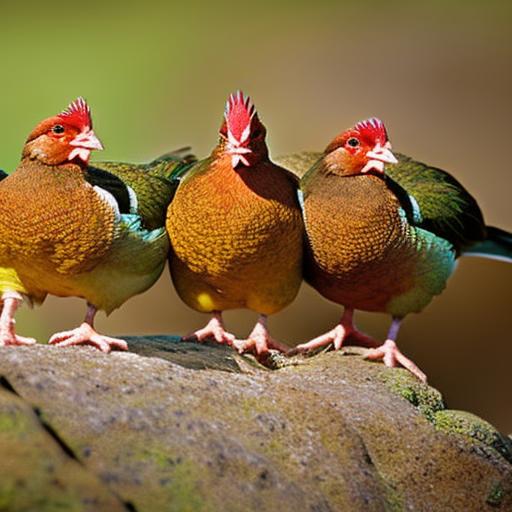Guinea fowl and chickens are both popular domesticated birds that are kept for various purposes. Guinea fowl, also known as guineas, are native to Africa and are known for their distinctive appearance and loud calls. They have a unique helmet-like crest on their heads and are covered in speckled feathers. Chickens, on the other hand, are domesticated birds that are believed to have originated from the red junglefowl. They come in various breeds and colors, with different sizes and feather patterns.
People keep guinea fowl and chickens for a variety of reasons. Some keep them as pets because of their interesting behaviors and personalities. Others keep them for farming purposes, such as for meat or egg production. Guinea fowl are known for their ability to control pests, making them valuable on farms or in gardens. Chickens, on the other hand, are popular for their egg-laying capabilities and can provide a steady supply of fresh eggs.
Key Takeaways
- Guinea fowl and chickens are both popular domesticated birds for their meat and eggs.
- Guinea fowl are more independent and better at foraging, while chickens are more social and better at laying eggs.
- Guinea fowl and chickens can live together, but it requires careful integration and management.
- Keeping guinea fowl and chickens together can provide benefits such as pest control and socialization.
- Challenges of keeping guinea fowl and chickens together include potential aggression and different dietary needs.
Differences between Guinea Fowl and Chickens
There are several physical and behavioral differences between guinea fowl and chickens. Physically, guinea fowl have a more slender body shape compared to chickens. They also have longer legs and necks, giving them a more upright posture. Guinea fowl have a distinctive call that is much louder than the typical chicken cluck. They are also known for their ability to fly, unlike most chicken breeds.
Behaviorally, guinea fowl are more active and alert compared to chickens. They are known for their strong flocking instinct and tend to roam in groups. Guinea fowl are also more independent and can be more skittish compared to chickens, which are generally more docile and easier to handle.
In terms of egg-laying, guinea fowl lay fewer eggs compared to chickens. While chickens can lay an average of 250-300 eggs per year, guinea fowl lay around 80-100 eggs per year. Guinea fowl eggs are smaller and have a harder shell compared to chicken eggs.
Can Guinea Fowl and Chickens Live Together?
Yes, guinea fowl and chickens can live together, but it depends on certain factors. The compatibility of the two species depends on the individual birds and their personalities. Some guinea fowl and chickens may get along well and coexist peacefully, while others may not tolerate each other’s presence.
It is important to note that guinea fowl and chickens have different social structures and communication styles. Guinea fowl are more territorial and can be aggressive towards other birds, especially during breeding season. Chickens, on the other hand, are more social and tend to establish a pecking order within their flock.
Advantages of Keeping Guinea Fowl and Chickens Together
There are several advantages to keeping guinea fowl and chickens together. One of the main benefits is pest control. Guinea fowl are excellent at controlling pests such as ticks, fleas, and insects. They have a natural instinct to forage for food and will actively seek out pests in the environment. This can be particularly beneficial for farms or gardens where pest control is important.
Another advantage is socialization. Guinea fowl and chickens can provide companionship for each other. They can interact and engage in social behaviors, which can be beneficial for their overall well-being. Having a mixed flock of guinea fowl and chickens can create a more dynamic and interesting environment.
Keeping guinea fowl and chickens together can also be cost-effective. By combining the two species, you can save on housing and infrastructure costs. They can share the same coop or housing area, reducing the need for separate accommodations.
Potential Challenges of Keeping Guinea Fowl and Chickens Together
While there are advantages to keeping guinea fowl and chickens together, there are also potential challenges to consider. One challenge is aggression issues. Guinea fowl can be territorial and may exhibit aggressive behavior towards chickens. This can lead to injuries or stress for the birds. It is important to monitor their interactions and separate them if necessary.
Another challenge is the risk of disease transmission. Guinea fowl and chickens can carry different diseases and parasites. It is important to practice good biosecurity measures to prevent the spread of diseases between the two species. This includes regular cleaning and disinfection of their living areas, as well as monitoring their health and seeking veterinary care when needed.
Additionally, guinea fowl and chickens have different dietary needs. Guinea fowl require a higher protein diet compared to chickens. They also have a higher need for insects and greens in their diet. It is important to provide appropriate feed and ensure that both species are getting the nutrients they need.
Preparing for Guinea Fowl and Chickens to Live Together

Before introducing guinea fowl and chickens, it is important to create a safe and secure environment for them. This includes providing adequate fencing to prevent predators from entering the area. It is also important to provide shelter that can accommodate both species comfortably.
Providing adequate space is also crucial. Guinea fowl and chickens both require space to roam and forage. They should have access to a large outdoor area where they can engage in natural behaviors such as dust bathing and scratching for food.
When introducing guinea fowl and chickens, it is best to do so gradually. Start by keeping them in separate enclosures within close proximity to each other. This allows them to become familiar with each other’s presence without direct contact. After a period of time, you can start allowing supervised interactions between the two species.
Integration Process for Guinea Fowl and Chickens
The integration process for guinea fowl and chickens should be done gradually to minimize stress and aggression. Here is a step-by-step guide on how to introduce them to each other:
1. Start by keeping guinea fowl and chickens in separate enclosures within close proximity to each other. This allows them to become familiar with each other’s presence without direct contact.
2. After a period of time, you can start allowing supervised interactions between the two species. This can be done by placing them in a neutral territory, such as a large fenced area or a supervised free-range area.
3. Monitor their behavior during the interactions. Look for signs of aggression or stress, such as pecking, chasing, or excessive vocalization. If any aggressive behavior occurs, separate the birds and try again at a later time.
4. Gradually increase the duration of the interactions over time. This allows the birds to become more comfortable with each other’s presence.
5. Once the birds are comfortable with each other, you can consider integrating them into the same living area. Monitor their behavior closely during this transition period and be prepared to separate them if necessary.
Housing Requirements for Guinea Fowl and Chickens
Guinea fowl and chickens have similar housing requirements, but there are some differences to consider. Both species require a secure and well-ventilated coop or housing area to protect them from predators and the elements.
For guinea fowl, it is important to provide roosting areas that are higher off the ground, as they have a natural instinct to roost in trees. They also require nesting boxes or areas where they can lay their eggs.
Proper ventilation is crucial for both guinea fowl and chickens to prevent respiratory issues. Ensure that there are adequate windows or vents in the coop to allow for fresh air circulation.
Cleanliness is also important to prevent the spread of diseases. Regularly clean and disinfect the coop or housing area, as well as the nesting boxes and roosting areas.
Feeding Guinea Fowl and Chickens Together
Guinea fowl and chickens have different dietary needs, but they can be fed together with some adjustments. Guinea fowl require a higher protein diet compared to chickens. They also have a higher need for insects and greens in their diet.
To meet the dietary needs of both species, you can provide a balanced feed that is suitable for both guinea fowl and chickens. This can be a commercial poultry feed that is formulated for mixed flocks. You can also supplement their diet with fresh greens, fruits, and vegetables.
It is important to monitor their feeding behavior and ensure that both species are getting the nutrients they need. If necessary, you can provide separate feeding areas to prevent competition or aggression during feeding time.
Keeping Guinea Fowl and Chickens Together Successfully
In conclusion, guinea fowl and chickens can live together successfully if certain factors are considered. They have different physical and behavioral characteristics, but with proper planning and management, they can coexist peacefully.
There are advantages to keeping guinea fowl and chickens together, such as pest control benefits, socialization benefits, and cost-effectiveness. However, there are also potential challenges to consider, such as aggression issues, disease transmission risks, and different dietary needs.
By creating a safe and secure environment, providing adequate space, and introducing them gradually, you can increase the chances of successful integration. It is important to monitor their behavior closely during the integration process and make adjustments as needed.
If you have the appropriate environment and resources, keeping guinea fowl and chickens together can be a rewarding experience. They can provide companionship, pest control, and other benefits that can enhance your farming or pet-keeping experience.
If you’re considering keeping guineas with chickens, it’s important to provide them with a suitable living environment. One crucial aspect is the chicken coop setup. To learn more about where to put your chicken coop, check out this informative article from Poultry Wizard. It provides valuable insights on selecting the right location for your coop, taking into account factors such as sunlight, ventilation, and predator protection. Understanding the ideal placement for your coop will help ensure a harmonious coexistence between guineas and chickens. Read more here.
FAQs
What are guineas and chickens?
Guineas and chickens are both domesticated birds commonly kept for their eggs, meat, and as pets. Guineas are smaller than chickens and have a distinctive appearance with their featherless heads and bony casques.
Can guineas and chickens be kept together?
Yes, guineas and chickens can be kept together. However, it is important to introduce them slowly and monitor their interactions to ensure they get along. Guineas can be more aggressive than chickens and may bully them, so it is important to provide enough space and resources for both types of birds.
What are the benefits of keeping guineas and chickens together?
Keeping guineas and chickens together can provide several benefits. Guineas are known for their ability to control pests such as ticks and insects, which can benefit both the guineas and the chickens. Additionally, guineas can act as an early warning system for predators, alerting the chickens to potential danger.
What are the potential drawbacks of keeping guineas and chickens together?
One potential drawback of keeping guineas and chickens together is that guineas can be more aggressive than chickens and may bully them. Additionally, guineas can be noisy and may disturb neighbors or other animals in the area. Finally, guineas may have different dietary needs than chickens, so it is important to ensure that both types of birds have access to appropriate food and water.
What should I consider before keeping guineas and chickens together?
Before keeping guineas and chickens together, it is important to consider several factors. These include the size of your coop and run, the number of birds you plan to keep, and the availability of resources such as food and water. Additionally, it is important to research the specific needs and behaviors of both guineas and chickens to ensure that they are compatible and can coexist peacefully.
Meet Walter, the feathered-friend fanatic of Florida! Nestled in the sunshine state, Walter struts through life with his feathered companions, clucking his way to happiness. With a coop that’s fancier than a five-star hotel, he’s the Don Juan of the chicken world. When he’s not teaching his hens to do the cha-cha, you’ll find him in a heated debate with his prized rooster, Sir Clucks-a-Lot. Walter’s poultry passion is no yolk; he’s the sunny-side-up guy you never knew you needed in your flock of friends!







